Global

Palestinians attend a rally marking the 34th anniversary of Hamas movement's founding, in Gaza City, Friday, Dec. 17, 2021. Gaza’s Hamas rulers collect millions of dollars a month in taxes and customs at a crossing on the Egyptian border – providing a valuable source of income that helps it sustain a government and powerful armed wing. After surviving four wars and a nearly 15-year blockade, Hamas has become more resilient and Israel has been forced to accept that its sworn enemy is here to stay. Photo: AP/UNB
Each month, hundreds of trucks heavy with fuel, cement and other goods cross a plowed no man's land between Egypt and the Gaza Strip - and Hamas becomes stronger.
Hamas collects tens of millions of dollars a month in taxes and customs at the crossing in the border town of Rafah, according to estimates. The funds help it operate a government and powerful armed wing while international aid covers most of the basic needs of Gaza's 2 million residents.
That this is happening with the quiet acquiescence of Israel, which considers Hamas a terrorist group, might come as a surprise.
Israel says it works with Egypt to supervise Rafah in return for quiet. The opening of the crossing "was a common interest for all parties to ensure a lifeline for Hamas that would enable it to maintain calm in Gaza and prevent an explosion," said Mohammed Abu Jayyab, an economist and editor-in-chief of a business daily in Gaza.
But there's more to it. After surviving four wars and a nearly 15-year blockade, Hamas has only become more resilient, and Israel has been forced to accept that its sworn enemy is here to stay.
It has largely accepted Hamas' rule in Gaza because a prolonged invasion is seen as too costly. At the same time, Hamas furnishes Israeli leaders with a convenient boogeyman -- how can the Palestinians be allowed statehood if they are divided between two governments, one of which steadfastly opposes Israel's very existence?
Meanwhile, Hamas' willingness to use violence - in the form of rockets, protests along the border or incendiary balloons - has helped it to wrest concessions from Israel.
"Hamas stuck to its position and the Israeli government made a lot of compromises" after the war in May, said Omar Shaban, a Gaza-based political analyst. "Hamas was stubborn."
Millions Each Month
After Hamas seized power from the Palestinian Authority in 2007, Israel and Egypt imposed a punishing blockade aimed at preventing the group from arming. A massive economy based on smuggling tunnels sprang up in and around Rafah. Hamas levied taxes on goods that were brought in.
Egyptian President Abdel-Fattah el-Sissi ordered the tunnels destroyed after leading the 2013 overthrow of an Islamist government that had been sympathetic to Hamas. But four years and another Gaza war later, Egypt agreed to Hamas' demands to open an above-ground commercial crossing.
Imports through Gaza's only other functioning commercial crossing - with Israel - are already taxed by Israeli authorities, who transfer some of the revenues to the Palestinian Authority, so Hamas can only exact small tariffs without noticeably inflating prices. Rafah belongs to Hamas.
Hamas does not release figures on public revenues or expenses. An Egyptian government media officer did not respond to a request for comment.
Some 2,000 truckloads of cement, fuel and other goods entered through Rafah in September, nearly twice the monthly average in 2019 and 2020, according to Gisha, an Israeli rights group that closely monitors the Gaza closures.
Rami Abu Rish, the managing director of the crossings at the Hamas-run Economy Ministry - who used to supervise tax collection from the tunnels - says authorities derive no more than $1 million a month from the Israeli crossing and up to $6 million from Rafah.
But the Palestinian Authority's Finance Ministry estimates Hamas derives as much as $30 million a month, mainly from taxes on fuel and tobacco coming in through Rafah, according to an official who spoke on condition of anonymity to discuss internal figures.
A cigarette importer in Gaza - who spoke on condition of anonymity for fear of jeopardizing the trade - said a small group of merchants imports 9,000 to 15,000 crates of cigarettes through Rafah each month, with Hamas charging $1,000 to $2,000 per crate. That alone would bring in $18 million on average.
Abu Jayyab, the Gaza economist, estimates Hamas makes up to $27 million a month. That's in addition to taxes and customs paid on cement and fuel.
Mohammed Agha, whose family owns a chain of gas stations in Gaza, was one of the few businessmen who agreed to speak publicly about Hamas' management of the crossings. He said gas station owners are forced to buy most of their fuel from the supplies coming through Rafah because Hamas benefits from the trade.
He said Hamas jailed him for two months in 2019 when he protested the arrangement.
"We as businessmen are sustaining the government" as the wider economy suffers, he said. "Before Hamas, 1,000 shekels (about $320) a month was enough for a family to get by. Now, 5,000 isn't enough because they tax the citizens."
The money Hamas collects could go to its estimated 50,000 civil servants or supporters of the political movement. Or it could be spent on Hamas' armed wing, which has improved its military capabilities with every war and fired over 4,000 rockets at Israel in 11 days last spring.
Hamas and Israel
Hamas burst onto the scene during the first intifada, or uprising, in 1987. As the then-dominant Palestine Liberation Organization joined the nascent peace process with Israel, Hamas embraced armed struggle.
The militant group launched scores of attacks, including suicide bombings, in the 1990s and 2000s. Hundreds of Israelis were killed. The group called for Israel's demise and rejected peace negotiations. It adopted a more moderate political platform in 2017, but its goals hardly changed.
In 2006, Hamas won a landslide victory in Palestinian elections, igniting a bloody power struggle with President Mahmoud Abbas' Fatah party. Hamas seized power in Gaza the following year, confining his authority to parts of the Israeli-occupied West Bank.
Abbas' peaceful approach has spared the West Bank from war and isolation, but he has been powerless to end the 54-year military occupation or stop the expansion of Jewish settlements. There have been no substantive peace talks in over a decade, and Israel's current prime minister, Naftali Bennett, is opposed to Palestinian statehood.
By contrast, Israel withdrew all its settlers and troops from Gaza in 2005 - after a second and more violent Palestinian uprising - and its soldiers cannot enter without risking war.
Israel refuses to talk to Hamas, but over the last decade it has negotiated a series of informal cease-fires through Egyptian, Qatari and U.N. mediators in which it has eased the blockade in return for calm.
Bassem Naim, a senior Hamas official, attributes much of his group's popularity to "the failure of the other project," referring to the Western-backed Palestinian Authority.
"The majority of Palestinian factions believe that resistance, and particularly armed resistance, has to be one of the tools in our struggle for freedom." He said the easing of the blockade "doesn't address the root of the problem, which is the siege and the occupation."
Bennett was an outspoken critic of the previous government's policy of allowing Qatar to send suitcases of cash into Gaza through an Israeli crossing.
But within months of becoming prime minister, the payments to needy families resumed through a U.N.-run voucher system, and Qatar resumed its contribution to the Hamas-run government's payroll in the form of fuel.
Israel denies it has given in to Hamas' demands. The new government says it has modified policies to try to ensure that humanitarian aid bypasses Hamas while responding militarily to even minor attacks.
All construction materials - including those brought in through Rafah - are imported through a monitoring system established with the U.N. and the PA after the 2014 war. Israel says it is barring all new, large construction projects until a deal is reached to return two captives and the remains of two Israeli soldiers held by Hamas since 2014.
Restrictions on so-called dual-use items that could be used for military purposes are in place at both the Israeli and Egyptian crossings, said Abu Rish, the Hamas crossing official.
A senior Israeli Defense Ministry official said the goal is to maximize humanitarian aid while minimizing the risk that it benefits Hamas. The official, who spoke on condition of anonymity in line with regulations, would only say that Israel is aware of the Rafah imports, and is relying on Egypt to ensure that the same restrictions are in place there as there are at the Israeli crossing.
'The other choice is not better'
Even as Hamas generates revenue for its government and from the crossings and taxing businesses, the international community sustains the people of Gaza.
U.N. agencies have spent more than $4.5 billion in Gaza since 2014, including $600 million in 2020 alone. Most of that funding goes through the U.N. agency for Palestinian refugees, which provides food aid, health services and operates schools for some 280,000 children.
The wealthy Gulf state of Qatar has sent $1.3 billion to Gaza since 2012 to fund reconstruction and health services, including $500 million pledged after the May war.
The largesse can be seen in Gaza City, where Qatari funds were used to build a scenic seaside promenade and expand a main road that runs past a Qatari-funded housing complex and the Qatari diplomatic mission, which resembles an embassy.
On the surface it all looks very prosperous, with families strolling past beach cafes, amusement parks and even a handful of luxury hotels. But the new construction is merely a backdrop to the grinding living conditions endured by most Gazans.
Unemployment hovers around 45% and nearly three out of five Gazans live in poverty, the World Bank reported in November. The average Gazan only has 13 hours of electricity a day and tap water is undrinkable.
Still, there has been almost no public opposition to Hamas within Gaza because Palestinians see no viable alternative. The Palestinian Authority has come to be seen by many as a corrupt, authoritarian extension of Israeli rule.
Mkhaimar Abusada, a political science professor at Gaza's Al-Azhar University, said the absence of protests "doesn't mean the Palestinians in Gaza are happy with Hamas."
He attributed the lack of visible opposition to Hamas' violent crackdown on protests over taxes and the rising cost of living in 2019, as well as the PA's failures.
"The other choice is not better than Hamas," he said. "Fatah and the PA are still seen by the Palestinian people as a very corrupted organization."
A poll this month found that despite the deprivations wrought by the confrontations between Hamas and Israel, 47% of Gazans would vote for Hamas if parliamentary elections were held, compared to just 29% who would vote for Abbas' Fatah.
Hamas isn't going anywhere. And Israel knows it.
"They are facing a number of problems here," Abusada said. "But resilience is part of their strategy. They're not going to give up."
From The Associated Press






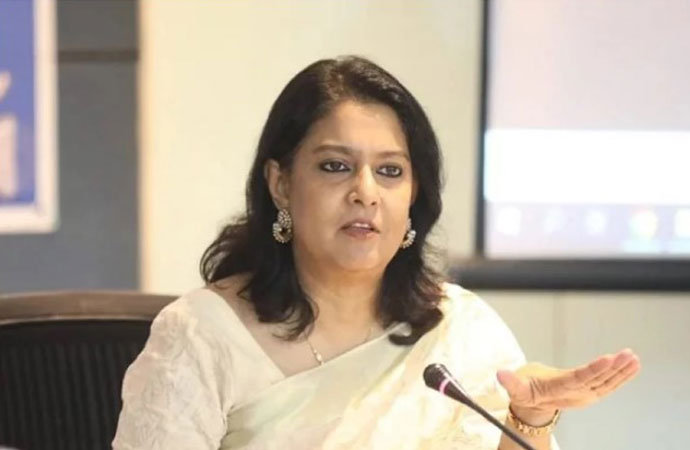












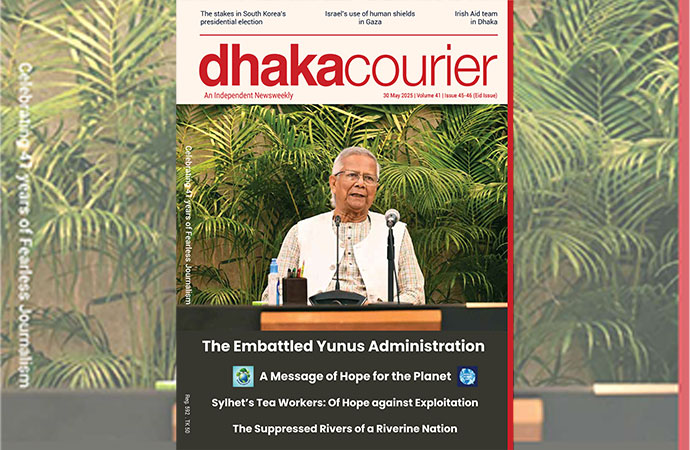
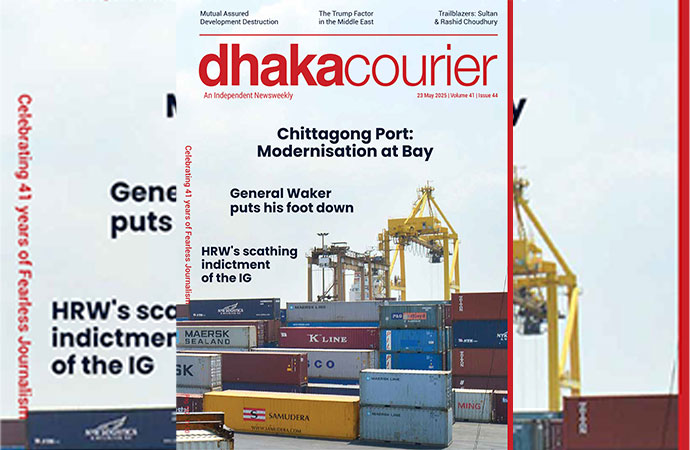
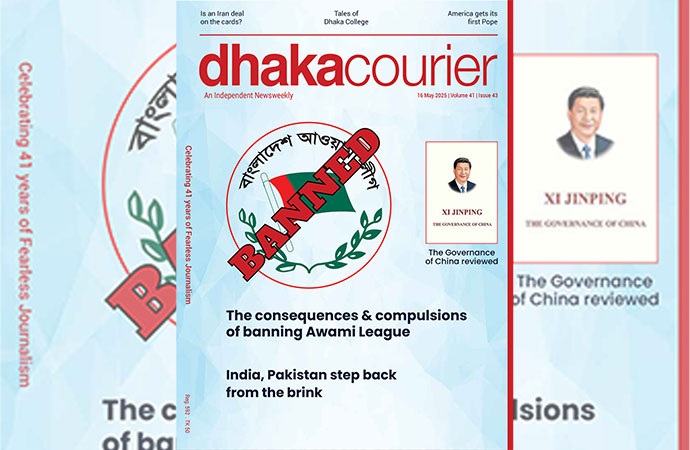
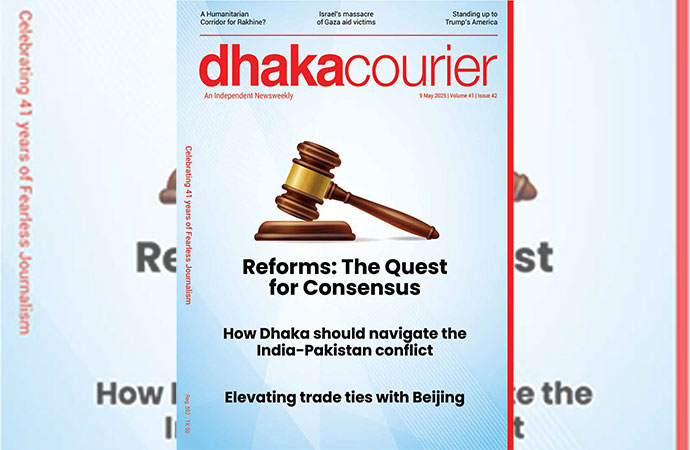


Leave a Comment
Recent Posts
Main Eid-ul-Azha congregation ...
Muslims across Bangladesh celebrated Eid-ul-Azha, one of the most sign ...
Spice Girls
Spice Girls was a British pop band. Spice Girls included: Victoria Bec ...
South Korea Is Facing a Triple Challenge
Kazi Shahidullah bahi and the DU: From a memorial me ..
France-Bangladesh cooperation in focus at ‘Strategic ..
Indian president hopes for ‘democratic, inclusive’ B ..